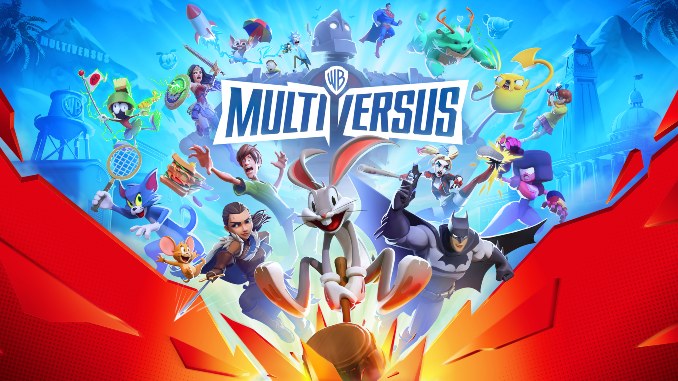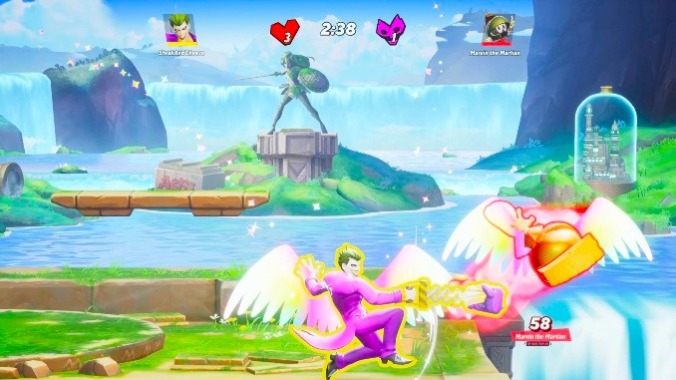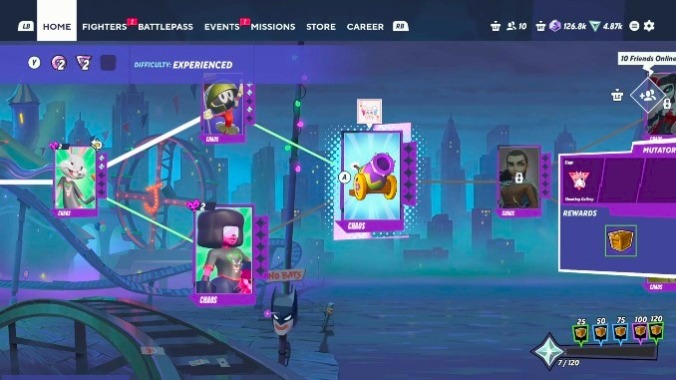MultiVersus Returns from the Dead Next Week, But Will Its New Additions Be Enough?
Games Features multiversus
MultiVersus, the Super Smash Bros.-inspired fighting game featuring Warner Bros. characters, has had a downright strange trajectory thus far. The game seemed an undeniable hit when its Open Beta kicked off in July 2022, and it quickly hit over 150k concurrent players on Steam as neophytes and genre diehards flocked to it in droves. But the good times wouldn’t last, and after the size of its community steeply declined, the servers for its beta were shut down in June 2023, just 11 months following its successful soft launch.
Its developer, Player First Games, promised it would eventually be back with a full release, claiming that this temporary shutdown was always the plan. But obviously, it’s hard to imagine they would have pulled the plug if it kept raking it in, and the move seemed a way to return to the drawing board so they could try and recreate the hype from its initial debut.
The issues that led to this decline were varied: it featured overbearing monetization and a stingy Battle Pass, the new characters added after release had a mixed reception, online play was inconsistent, there were tons of small gameplay issues, such as off-kilter hitboxes, and more. Although the news that it was going offline was stunning at first, especially considering its early success, this decision made sense in some ways. Player First Games appears to be a relatively small studio, and it was probably difficult to plug existing holes while also meeting the demands of a live service game. I’m not sure most will be particularly forgiving of the situation, given they took lots of people’s money in cosmetic purchases and more, but the move did make some amount of sense given the tailspin the game was in.
Now, close to a year after it was shut down, MultiVersus will finally return with its 1.0 release on May 28, alongside additional characters, modes, and significant gameplay updates. We got hands-on time with a preview build which gave us a solid idea of what the game will look like at launch. So, this begs the question, will the changes be enough for the game to reclaim its previous glory, or is it fated to repeat the same mistakes?

Starting with an area that previously received criticism, the frequently lackluster additions to its launch roster, the new characters coming to the full release are largely an exciting bunch. In an unexpected turn, Jason Voorhees from Friday the 13th makes his debut, and he’s a heavyweight newcomer who is a blast to play. He’s very hard to kill (which is appropriate given the source material) and has been reenvisioned as an imposing big body Tank who unleashes slow but brutal strikes. From his vicious up special where he hooks you with his axe, to a hard-hitting shoulder charge dash attack, his moves convey that you don’t want to let this dude catch you. There’s also the amusing inclusion of a teleport ability, which explains how he always manages to corner his prey despite never breaking into more than a power walk. Another nice addition is the killer clown himself, Joker. He utilizes an arsenal of ranged attacks to keep foes at bay, including acid, a rocket launcher, a deck of throwable playing cards, and more. And hey, it also feels very good when you bash guys with his cane.
Based on online reactions, Banana Guard is the most controversial of the new characters, which is a ridiculous sentence, but bear with me. This out-of-left-field inclusion from Adventure Time is clearly positioned as a joke character, but that didn’t stop many from being ticked off that he was included over more popular requests. Strangely enough, his relatively bland toolkit felt quite strong, so despite his unappealing energy, he may prove a popular pick. Agent Smith from The Matrix was also recently revealed, and while I doubt he’ll be in the game at release because he wasn’t in the preview build, the fact he’s coming at all shows that most of their new character selections have been better at playing up nostalgia and making use of Warner Bros. catalog than what we saw previously. Although I was hoping for a few more fresh fighters at launch, things seem to be trending in the right direction here overall.
As for what else is new, the Rift mode is the most notable addition, a single-player experience where you battle through stages and quip with the cast. Here, you unlock gems that grant passive abilities, participate in brawls that introduce unique modifiers, like being able to jump infinitely, and attempt challenges for additional rewards. Although this mode was nothing revelatory and its CPU opponents were too much of a pushover, the numerous modifiers and fight setups created some solid variety to these bouts. Ideally, this mode could set up some novel interactions between its eclectic cast and help bridge the gap for those not as interested in sweating it out online and obsessing over tier lists.

That said, I’ll admit that I am someone who likes sweating it out online, which takes me to the biggest surprise with this preview and an element that honestly bummed me: the pace of play is much slower and less frenetic than during the beta. As far as I can tell from what I played, the two biggest reasons things felt this way are that the dash has been heavily nerfed and that you hang in the air longer after jumping.
I won’t fully delve into all the nerdy details, but basically, in the previous version of the game, dashing could be canceled into jumps and attacks, letting an experienced player deftly maneuver the battlefield. You could dash, jump, quickly land, do another dash, and another jump, chaining these together to traverse the stage at a breakneck pace. In short, it was pretty sick, resulting in freeform movement that set it apart from many other modern platform fighters. However, in the new version, when you cancel a dash into something else, it eats through half your stamina (it used to go through maybe a tenth?), meaning this can only be done very sparingly. On top of this, jumps feel floatier, and you can’t instantly cancel them into aerial attacks anymore, making offense seem a bit stiffer and less expressive.
While these movement abilities were admittedly too strong in early access, as you had access to an invincible dash that could basically be spammed with little recourse, I’d argue they’ve leaned too far in the opposite direction here and partially undermined what drew me to this experience in the first place. With this more lethargic pace, it’s particularly brutal to go up against projectile-oriented foes. In my matches against the screen-filling antics of Bugs Bunny, I came away wanting to borrow Elmer Fudd’s shotgun. In reality, I’m not sure how many people will care about these changes because platform fighters like Super Smash Bros. have always tried to appeal to those who aren’t going to obsess over these kinds of little freak details, but I imagine I won’t be the only one unhappy with these updates.
Still, I should point out that there’s still plenty of fun to be had: attacks can still be chained together to create cool combos, characters have relatively varied playstyles that make scraps feel novel, and not all of the ground-based movement has been gutted. Maybe this slower tempo will grow on me with time, and hopefully, its other strengths can fill in the gaps, but I can’t deny I’m hoping for some of this previous agility to be reintroduced in a patch down the line.
Beyond this, Player First Games gave an overview of how the previously maligned microtransactions will be altered in a recent blog post. They’ve promised that Battle Passes will have more stuff, like the currency used in purchasing subsequent passes, which is definitely a positive sign. They’ve also committed to free rewards for returning players, like Jason Vorhees, and are throwing in Banana Guard for anyone who plays at launch.
That said, the devil is in the details with how these microtransactions are implemented, as their cost and how easy it is to earn things without paying is what causes these games to land somewhere between tolerable and overbearingly exploitative, and the beta definitely leaned too close to the latter. Like many experiences in this style, once I fell off its FOMO treadmill, I felt so free from its daily challenges and other subtle manipulations that I had no desire to get back on. I understand they have to make a buck somehow as a free-to-play experience, but the grind was simply too great before, and ideally, that will be fixed this time around.
This all brings us back to the original question: are the changes here enough to right the ship? In many ways, the pressure that MultiVersus is under to replicate its impressive launch feels more than a little unfair. Traditionally, fighting games don’t need anything near the game’s initial numbers to be healthy and have an active community. I don’t doubt the free-to-play model puts a much greater incentive for it to hit loftier player counts, but the idea that it might need to achieve crazy figures just to stay alive emphasizes the fragility of live service games. It also doesn’t help that David Zaslav has slashed and burned everything in his wake after taking over Warner Bros. Discovery and that the game industry is broadly collapsing in on itself at the moment.
All in all, I’m curious to see if what’s here will “save” this game in the face of increasing expectations. While some of its additions are great, such as its new characters, I imagine at least a few other folks won’t jive with the core gameplay changes, and its microtransaction situation will only be clear once its out. Still, I hope the full release demonstrates the hard lessons learned from its soft launch, largely because I’d like it to rekindle what made me sink over a hundred hours into the beta. And even if it’s not a mega-hit, it’d be nice if it sticks around because I’d like to believe that not every game needs to do preposterous numbers to keep its servers online. We’ll find out soon enough when MultiVersus re-launches on May 28.
Elijah Gonzalez is an assistant Games and TV Editor for Paste Magazine. In addition to playing and watching the latest on the small screen, he also loves film, creating large lists of media he’ll probably never actually get to, and dreaming of the day he finally gets through all the Like a Dragon games. You can follow him on Twitter @eli_gonzalez11.